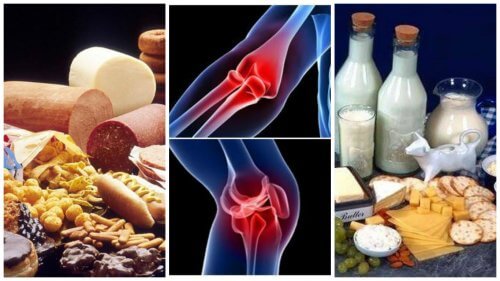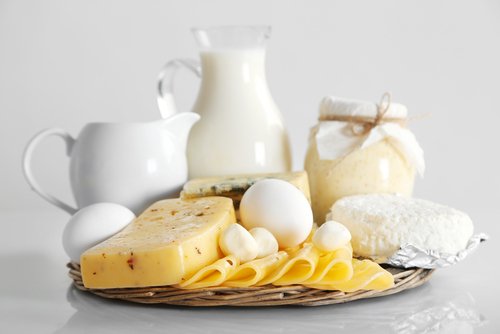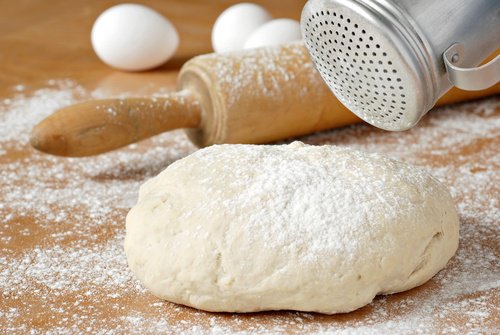8 Foods to Avoid if You Have Problems with Your Joints

Your joints support your body. They connect your bones and make it possible for you to move. However, joint pain is a common problem, caused by inflammation, injuries, or a chronic disease. If you have problems with your joints, there are certain foods you should definitely avoid.
You might like: Joints: Their Importance and Necessary Supplements
Joint pain usually appears with age. However, it can also happen to young people due to injury or premature deterioration. In any case, this is a condition that reduces your quality of life. Above all, it gets in the way of movement and the ability to carry out daily tasks.
There are many ways to reduce the intensity of the symptoms. Additionally, there are some things that can even increase pain. For example, eating certain kinds of foods can increase inflammation. They also reduce the amount of nutrients you absorb and get in the way of healing the problems with your joints.
This can cause increases in your weight and can even cause you to retain toxins in your blood. Among other things, this can lead to more serious diseases. We know that not everyone knows what these foods are. So, in this article, we will share the 8 top foods you should avoid if you have problems with your joints.
Stay away from them!
1. Processed and red meats

Both processed and red meat have harmful chemical substances that can increase inflammation in your body.
The nitrites and purines stay in your body. In the long run, they cause pain and stiffness in your joints.
2. Refined sugars
Eating too many refined sugars has a lot to do with an imbalance in your body’s inflammation processes. This includes all sources of refined sugar.
This food product increases the production of chemicals called cytokines. These work in your body to increase pain and swelling.
Also, they have a high calorie count. Consequently, eating them can increase your weight, which results in more pressure on your muscles and joints.
3. Milk and dairy products

Milk and dairy products have been related to problems in your joints. This includes an increased tendency for young people to have joint pain.
This kind of food has high levels of the protein casein. This causes increased inflammation in your body. Additionally, this substance irritates the tissues that protect your joints. In excessive amounts, it can cause them to deteriorate.
Also, they are foods that are rich in saturated fats. Because of this, they increase your body weight and stimulate the inflammation of fatty tissues.
4. Salt
Eating too much table salt is related to the development of several chronic diseases that affect your quality of life. This condiment alters the balance of liquids in your body. At the same time, it increases the risk of heart disease and inflammation.
Your body needs a small amount of salt to function properly. However, we usually eat more than 10 times what we need!
5. Corn oil

6. Eggs
It has been shown that eggs are healthy and give us an important amount of proteins. However, eating them on a regular basis is not advised if you have problems with your joints.
Since they come from animals, they give a significant amount of arachidonic acid. This is a substance in the yoke that appears to increase inflammation.
You might like: Is Eating Eggs Good or Bad for You?
7. Refined grains and flour

Refined grains and flours are powerful inflammatory products. They can cause deterioration and pain in your joints.
First of all, they have a high amount of gluten. This is hard on your metabolism. Gluten causes the production of substances that increase the sensation of pain.
Also, eating them on a daily basis can have a relationship with the appearance of chronic inflammation and autoimmune diseases.
Moreover, since they have empty calories, they contribute to being overweight, heart disease, and diabetes.
8. Fast and fried foods
Commercial fast and fried foods use high levels of saturated fats and flours. These increase the inflammation in your fatty tissues.
They can also cause the development of heart problems. At the same time, they make inflammation worse if you have problems with your joints such as what happens with certain diseases.
In conclusion, your diet plays an important role in your joint health. Reducing or eliminating the amount of these foods in your diet can help you to reduce pain and the symptoms associated with it.
Also, it’s wise to eat more foods rich in antioxidants and omega 3 fatty acids that have an anti-inflammatory effect.
All cited sources were thoroughly reviewed by our team to ensure their quality, reliability, currency, and validity. The bibliography of this article was considered reliable and of academic or scientific accuracy.
- Chai W., Morimoto Y., Cooney RV., Franke AA., et al., Dietary red and processed meat intake and markers of adiposity and inflammation: the multiethnic cohort study. J Am Coll Nutr, 2017. 36 (5): 378-385.
- Vitellio P., Celano G., Bonfrate L., Gobbetti M., et al., Effects of bifidobacterium longum and lactobacillus rhamnosus on gut microbiota in patients with lactose intolerance and persisting functional gastrointestinal symptoms: a randomised, double blind, cross over study. Nutrients, 2019.
This text is provided for informational purposes only and does not replace consultation with a professional. If in doubt, consult your specialist.








